medicinal mushroom blend
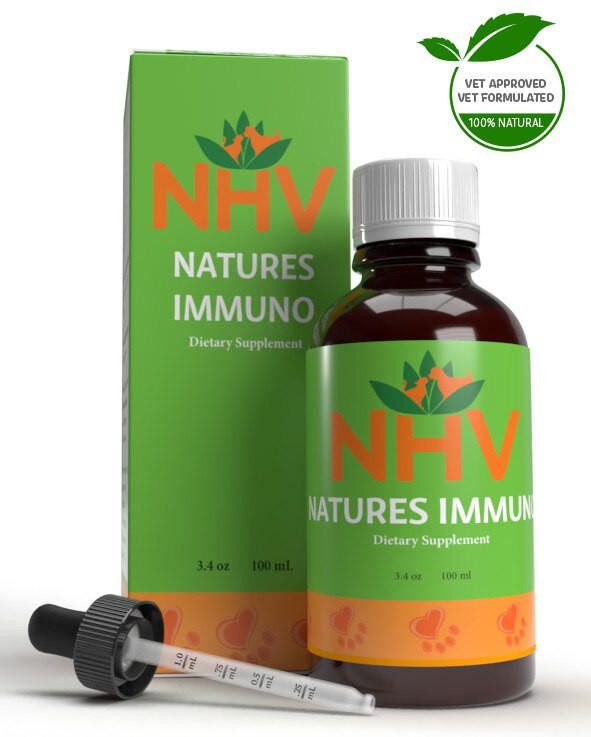
free shipping over $100 (USA & Canada)
1-877-937-4372 the pet expert hotline
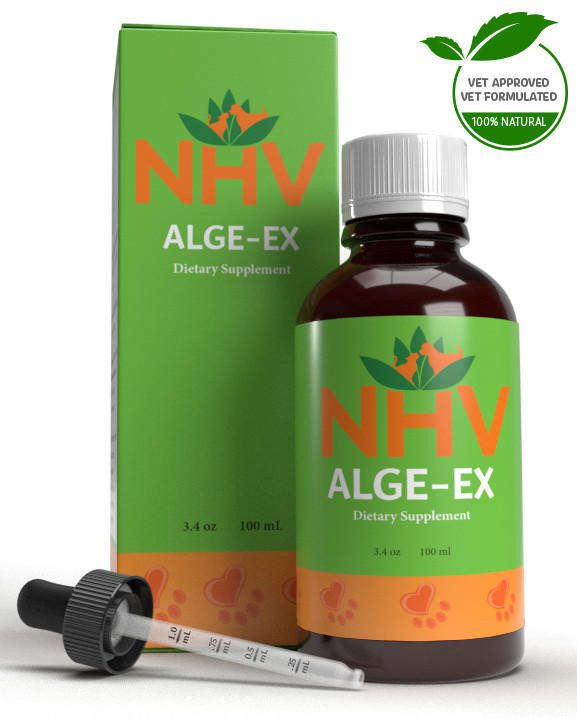
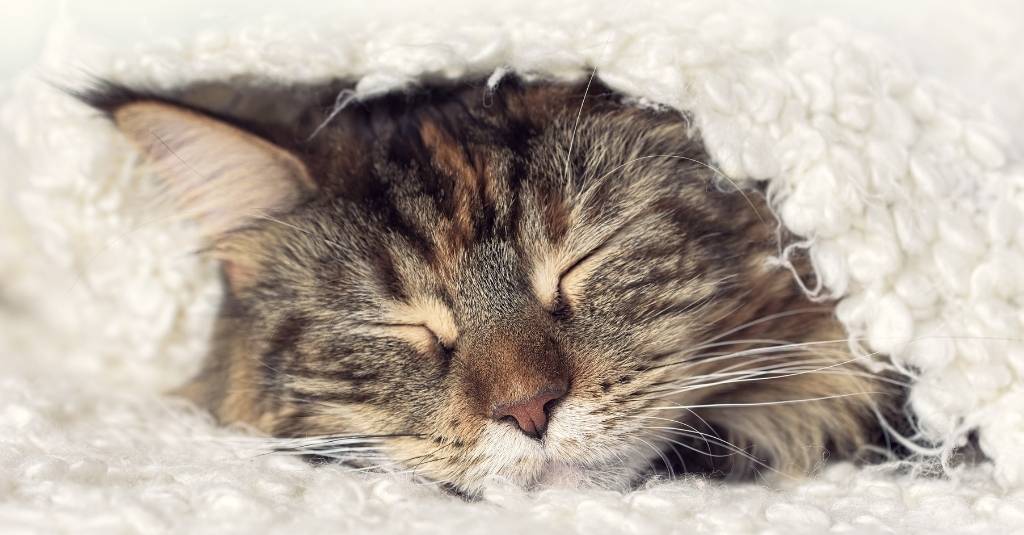
“Rodent Ulcers”, otherwise known as indolent ulcers or stomatitis, are eosinophilic granulomas or a solid grouping of inflammatory cells coming together in a lump or solid structure. Eosinophils are a type of white blood cell that is commonly associated and elevated with allergies. They are part of the immune system defending against parasites. Unfortunately, they can be tricked into thinking that allergens are attempting invasion. The eosinophils then release inflammatory chemicals inappropriately, creating a sensation of itching, redness, and swelling. An eosinophilic granuloma complex (EGC) is broken up into 3 classes; the indolent ulcer, the eosinophilic plaque, and the eosinophilic granuloma.
Cats with rodent ulcers have erosion on the margin of their upper lip
An individual cat may have any or all of them. It is designed to be attracted to areas where parasitism is occurring and once there it releases biochemicals to destroy the invading pathogens. Cats with rodent ulcers have erosion on the margin of their upper lip. Sometimes these ulcers also develop on the tongue.
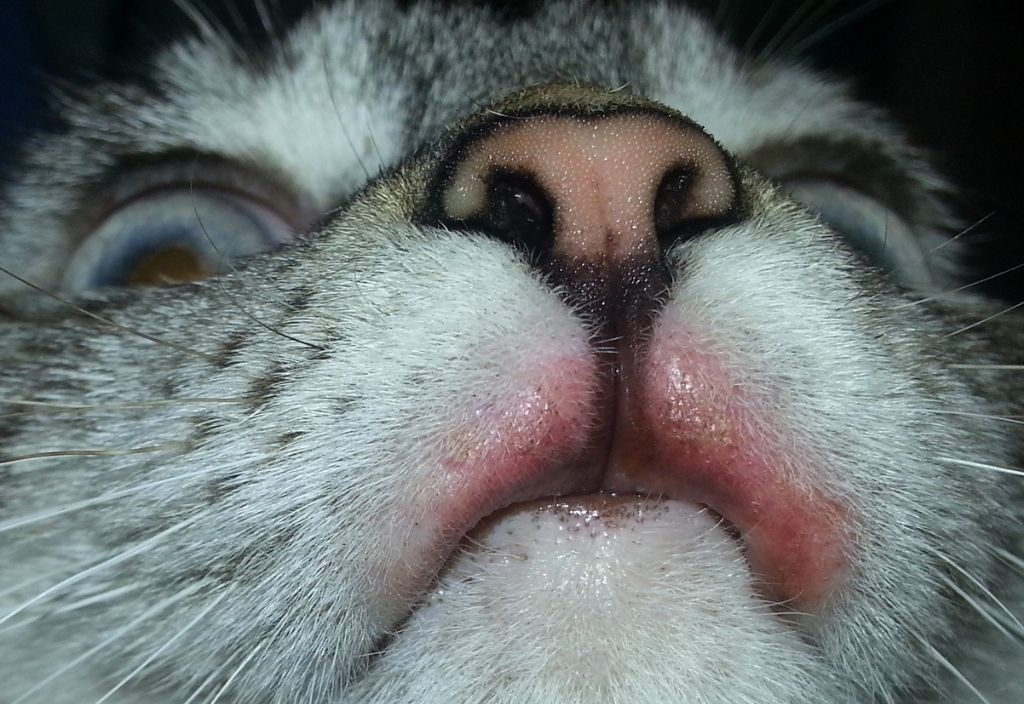
Eosinophilic plaques typically look like a raised thickened raw area of skin usually on the belly, inner thigh, or throat area. These lesions are extremely itchy. The Eosinophilic Granuloma produces a classical swollen lower lip or chin or a classical long, narrow lesion running down the back of the thigh. Sometimes proliferations grow from the actual footpads where they ulcerate as the cat is forced to walk on them.
Diagnosis is by a physical exam by your veterinarian, blood work and biopsy are recommended. These conditions most commonly have an underlying allergic basis though it is not always possible to determine what that allergic basis is. Fleas, food, and parasites are the most common underlying reasons. It is important to biopsy the lesions to confirm EGC and rule out neoplasia. A biopsy may also rule out other less common underlying causes such as Demodex mites or ringworm fungi.
The first step is ruling out parasites, flea infestation, and food allergies and treat those to start. Sometimes steroids or cyclosporine are necessary to treat tough cases. If allowed to go untreated, the ulcer can be very destructive to the upper lip and is uncomfortable. In addition to treating the problem, immune support with NHV Alge-Ex, Natures Immuno and ES Clear are helpful in supporting the immune system to fight the allergy. It may also be beneficial to detoxify the cat’s system with NHV BK Detox and Milk Thistle and reduce the short-term inflammation with Ouch Away Spray or Turmeric.
The eosinophilic granuloma is not a completely understood condition. For now, it is best to view it as an extreme symptom of another underlying skin disease.
medicinal mushroom blend

Blend of medicinal mushrooms (turkey tails, cordyceps, reishi, shiitake, agaricus)
buy 2 and save $3
3 month supply for a small to medium size pet

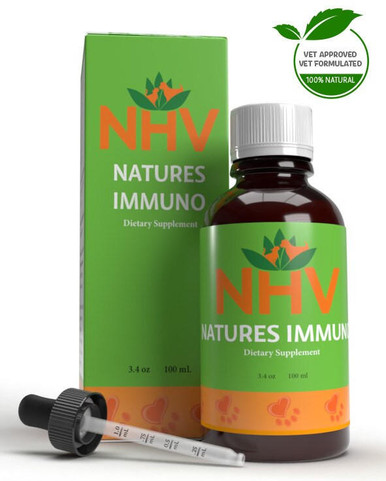

Medicinal mushroom blends are used by holistic and conventional veterinarians to help cats suffering from a variety of health conditions. Their immune supporting effects help with feline cancer, chronic feline infections, liver disorders, compromised immune systems, endocrine disorders, and kidney, respiratory, and cardiovascular problems.
Medicinal mushrooms are currently being researched and studied for their vast array of health benefits. NHV uses these mushrooms as a primary ingredient in supplements that support the immune system of cats.
The healing power of medicinal mushrooms has been known throughout Asia for thousands of years. The pharmacological potential of medicinal mushrooms is being extensively studied around the globe. Research is finding that specific medicinal mushrooms, like Turkey Tail mushrooms, may have the potential to help treat cancer, balance the immune system, and aid with digestive problems.
“The mounting evidence from various research groups across the globe, regarding anti-tumor application of mushroom extracts unarguably make it a fast-track research area worth mass attention.” – (Patel and Goyal, 2012)
The five well-researched mushrooms contained in our vet-formulated cat immune support supplement blend include:
Because this blend is in liquid form, it helps increase the bioavailability of the mushrooms, so your cat absorbs the medicine at a faster rate.
Use NHV’s holistic immune cancer support for cats with treatment prescribed by your vet for comprehensive care. You can always ask the experts at NHV where our pet experts are here to help answer questions, offer guidance and give support along the way.
Read more about cat immune support using the miracles of medicinal mushrooms on our blog because, at NHV, we care about your cat’s health naturally.
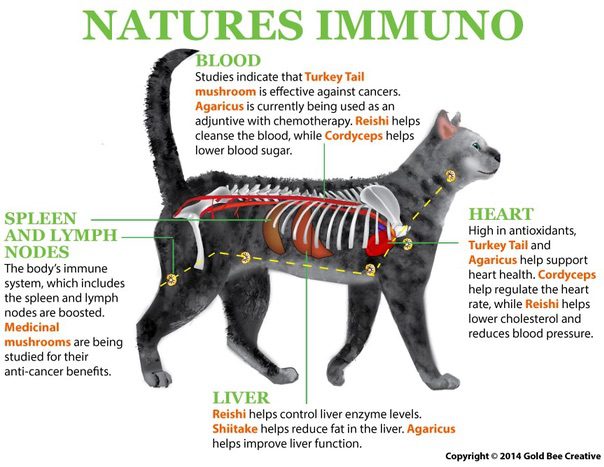
Turkey Tail mushroom has traditionally been used in Native American herbalism and in Chinese medicine to help improve immune function. It is a mushroom that has undergone a considerable resurgence in modern research for its health benefits. Studies have shown that it is beneficial for a wide variety of cancers, including mammary gland cancer and lymphoma. Researchers believe that Turkey Tail mushrooms contain properties that fight cancer while also helping to strengthen the immune system. It has antioxidant, anticarcinogenic, immune-modulating, anti-inflammatory, and cardioprotective properties.
Cordyceps mushroom is rich in phytonutrients and contains polysaccharides, which help with antioxidant properties. Research has indicated that cordyceps have anti-tumor, immune stimulating and hypoglycemic activity. They are beneficial for diabetes as they help lower blood sugar. Cordyceps are also beneficial for heart health, liver and kidney health.
Reishi mushroom has been used for thousands of years in traditional Chinese Medicine. Current research indicates that reishi mushrooms are helpful in supporting the immune and cardiovascular systems, as well as helping to increase oxygenation of the blood. Reishi is effective against sarcoma and tumor necrosis. Reishi is currently being used in Japan and China in conjunction with chemotherapy drugs.
Shiitake mushroom has been used for thousands of years in herbalism, and is also a popular cooking ingredient. Research indicates that Shiitake has strong antibiotic and antibacterial properties against a broad spectrum of pathogens. In addition to its potential cancer-fighting properties, it is useful in supporting heart health as it lowers cholesterol and helps lessen plaque in the arteries.
Agaricus mushroom is studied for their usefulness in preventing cancer cell production. Agaricus is considered an antimutagenic and an adaptogen, which helps combat stress and supports endocrine function. It is useful for pets with autoimmune conditions, digestive issues, and heart problems. Agaricus is being used in Japan as an adjunctive with chemotherapy treatments.
Select your pet's weight to determine the correct dose.
To be taken twice daily.
Determine your pet’s weight and then use the easy chart below to determine the correct dose. You can safely double the recommended dosage.
Pet's Weight Dosage
0 - 15 lb 0.5 mL
16 - 30 lb 1.0 mL
31 - 45 lb 1.5 mL
46 - 60 lb 2.0 mL
61 - 75 lb 2.5 mL
Over 75 lb 3.0 mL
How to Administer
Shake well before use. The easiest method is to use the dropper provided and place the drops into your pet’s food or favorite treat. You can also use the dropper and squirt directly into the pet’s mouth. Some pets can be finicky, if this occurs consider hiding the drops in foods most pet’s love such as fish, chicken, yogurt, or a favorite treat. If your pet only eats dry food then soak a few kibbles at feeding time.
For Best Results
Herbal dietary supplements are beneficial to the health and well-being of your pet and are safe for long-term use. Every pet responds to natural herbal supplements differently, therefore it is important to be consistent and administer the product daily. Supplements generally take two to four weeks to take effect, however this will vary from one animal to the next.
Product Storage
All NHV Natural Pet Products are pure herbal extracts and contain no artificial additives, preservatives or coloring. Shelf life after opening is 6 months and must be refrigerated after opening.
Medicinal mushroom blends are used by holistic and conventional veterinarians to help cats suffering from a variety of health conditions. Their immune supporting effects help with feline cancer, chronic feline infections, liver disorders, compromised immune systems, endocrine disorders, and kidney, respiratory, and cardiovascular problems.
Medicinal mushrooms are currently being researched and studied for their vast array of health benefits. NHV uses these mushrooms as a primary ingredient in supplements that support the immune system of cats.
The healing power of medicinal mushrooms has been known throughout Asia for thousands of years. The pharmacological potential of medicinal mushrooms is being extensively studied around the globe. Research is finding that specific medicinal mushrooms, like Turkey Tail mushrooms, may have the potential to help treat cancer, balance the immune system, and aid with digestive problems.
“The mounting evidence from various research groups across the globe, regarding anti-tumor application of mushroom extracts unarguably make it a fast-track research area worth mass attention.” – (Patel and Goyal, 2012)
The five well-researched mushrooms contained in our vet-formulated cat immune support supplement blend include:
Because this blend is in liquid form, it helps increase the bioavailability of the mushrooms, so your cat absorbs the medicine at a faster rate.
Use NHV’s holistic immune cancer support for cats with treatment prescribed by your vet for comprehensive care. You can always ask the experts at NHV where our pet experts are here to help answer questions, offer guidance and give support along the way.
Read more about cat immune support using the miracles of medicinal mushrooms on our blog because, at NHV, we care about your cat’s health naturally.

Turkey Tail mushroom has traditionally been used in Native American herbalism and in Chinese medicine to help improve immune function. It is a mushroom that has undergone a considerable resurgence in modern research for its health benefits. Studies have shown that it is beneficial for a wide variety of cancers, including mammary gland cancer and lymphoma. Researchers believe that Turkey Tail mushrooms contain properties that fight cancer while also helping to strengthen the immune system. It has antioxidant, anticarcinogenic, immune-modulating, anti-inflammatory, and cardioprotective properties.
Cordyceps mushroom is rich in phytonutrients and contains polysaccharides, which help with antioxidant properties. Research has indicated that cordyceps have anti-tumor, immune stimulating and hypoglycemic activity. They are beneficial for diabetes as they help lower blood sugar. Cordyceps are also beneficial for heart health, liver and kidney health.
Reishi mushroom has been used for thousands of years in traditional Chinese Medicine. Current research indicates that reishi mushrooms are helpful in supporting the immune and cardiovascular systems, as well as helping to increase oxygenation of the blood. Reishi is effective against sarcoma and tumor necrosis. Reishi is currently being used in Japan and China in conjunction with chemotherapy drugs.
Shiitake mushroom has been used for thousands of years in herbalism, and is also a popular cooking ingredient. Research indicates that Shiitake has strong antibiotic and antibacterial properties against a broad spectrum of pathogens. In addition to its potential cancer-fighting properties, it is useful in supporting heart health as it lowers cholesterol and helps lessen plaque in the arteries.
Agaricus mushroom is studied for their usefulness in preventing cancer cell production. Agaricus is considered an antimutagenic and an adaptogen, which helps combat stress and supports endocrine function. It is useful for pets with autoimmune conditions, digestive issues, and heart problems. Agaricus is being used in Japan as an adjunctive with chemotherapy treatments.
Select your pet's weight to determine the correct dose.
To be taken twice daily.
Determine your pet’s weight and then use the easy chart below to determine the correct dose. You can safely double the recommended dosage.
Pet's Weight Dosage
0 - 15 lb 0.5 mL
16 - 30 lb 1.0 mL
31 - 45 lb 1.5 mL
46 - 60 lb 2.0 mL
61 - 75 lb 2.5 mL
Over 75 lb 3.0 mL
How to Administer
Shake well before use. The easiest method is to use the dropper provided and place the drops into your pet’s food or favorite treat. You can also use the dropper and squirt directly into the pet’s mouth. Some pets can be finicky, if this occurs consider hiding the drops in foods most pet’s love such as fish, chicken, yogurt, or a favorite treat. If your pet only eats dry food then soak a few kibbles at feeding time.
For Best Results
Herbal dietary supplements are beneficial to the health and well-being of your pet and are safe for long-term use. Every pet responds to natural herbal supplements differently, therefore it is important to be consistent and administer the product daily. Supplements generally take two to four weeks to take effect, however this will vary from one animal to the next.
Product Storage
All NHV Natural Pet Products are pure herbal extracts and contain no artificial additives, preservatives or coloring. Shelf life after opening is 6 months and must be refrigerated after opening.
immune support
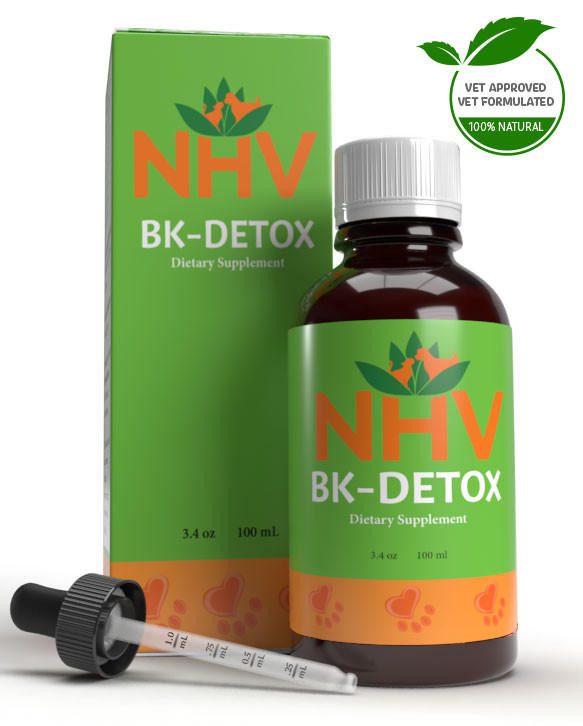
Cat Immune System Booster, Cancer Support, Gentle Detox, and Blood Cleanser
buy 2 and save $3
3 month supply for a small to medium size pet.
All natural, gentle, herbal support for cats, dealing with compromised immune systems that helps detoxify the vital organs and blood.

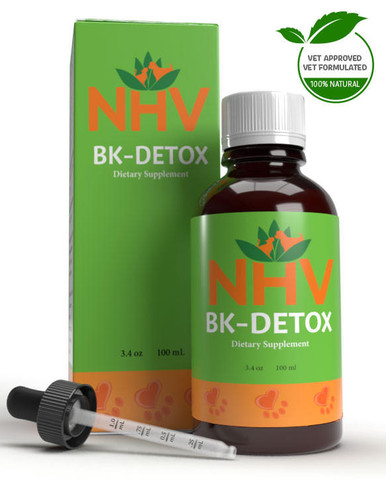
All natural, gentle, herbal support for cats, dealing with compromised immune systems that helps detoxify the vital organs and blood.

Cats live in a world full of pollutants that they breathe, ingest, and play in every day. BK Detox is a gentle herbal detox that helps Protect them with BK Detox, an all-natural cat immune system booster and detoxifier specially formulated to restore balance, regulate the immune system, and help your pet live a healthier, happier life.
BK Detox is especially useful for pets suffering from:
BK Detox will help your cat to gently flush out toxins from their vital organs and cleanse the blood. This is a cat immune supplement that promotes their long-term vitality.
The immune system plays an important role in helping your cat resist infection and overcome sickness.
When the immune system is compromised, toxins can accumulate in your cat and cause problems including liver disorders, urinary tract infections, skin allergies, tumors, bad breath, and respiratory issues.
“Boost” is a common term used for supplements that make the immune system work better, but supplements like NHV more accurately help to balance the immune system. The goal of cat immune system boosters like BK Detox is to balance the immune system so that it can more effectively respond to threats and process toxins out of their body.
BK Detox was formulated by a holistic veterinarian completely from 100% natural ingredients. It is safe for your cat to take alongside any conventional medicine prescribed by their veterinarian, including long-term medications.
See how BK Detox helped Holly with her allergies
How do you know if BK Detox will help your cat? Call our pet expert hotline at 1-877-937-4372 with questions about boosting your cat’s immune system. You can also visit our Pet Expert Q&A.

Red Clover – A blood-purifying herb with antibiotic and anti-inflammatory properties. It promotes cleansing and the elimination of toxins and deposits through diuretic and expectorant activity.
Cleavers – A tonic that increases the circulation of lymph-impaired areas of the body and aids in the drainage of lymph-engorged cysts, tumors, and inflamed tissues of the urinary tract.
Neem – An evergreen tree with powerful blood purifying and detoxifying effects.
Oregon Grape – Supports and improves digestion by helping rid the body of waste and toxins in the blood.
Gotu Kola – A small green herb known for its cleansing, diuretic, and strong antioxidant properties.
Buckthorn – A gentle laxative and blood-cleansing tonic.
Burdock – A highly effective blood purifier abundant in calcium, phosphorus, iron, thiamine, and riboflavin. Supports the entire body while gently eliminating toxic build up.
Sarsaparilla – A cleansing herb that stimulates the kidneys to flush deposits and clear toxins.
Echinacea Angustifolia – Cat immune system booster. Stimulates the body’s defense mechanism.
Chaparral – A blood purifying antioxidant rich in amino acids.
Prickly Ash – A tonic that stimulates the entire lymphatic system to encourage the elimination of toxic metabolites.
Select your pet's weight to determine the correct dose.
Bk Detox can be used as a detoxifier every 6 months. For best results administer the recommended dosage until the bottle is finished.
To be taken twice daily. Determine your pet’s weight and then use the easy chart below to determine the correct dose. This is the minimum dosage.
Pet's Weight Dosage
0 - 15 lb = 0.5 ml
16 - 30 lb = 1.0 ml
31 - 45 lb = 1.5 ml
46 - 60 lb = 2.0 ml
61 - 75 lb = 2.5 ml
Over 75 lb = 3.0 ml
How to Administer: Shake well before use. The easiest method is to use the dropper provided and place the drops into your pet’s food or favorite treat. You can also use the dropper and squirt directly into the pet’s mouth. Some pets can be finicky, if this occurs consider hiding the drops in foods most pet’s love such as fish, chicken, yogurt, or a favorite treat. If your pet only eats dry food then soak a few kibbles at feeding time.
For Best Results
Herbal dietary supplements are beneficial to the health and well-being of your pet and are safe for long-term use. Every pet responds to natural herbal supplements differently, therefore it is important to be consistent and administer the product daily. Supplements generally take two to four weeks to take effect, however this will vary from one animal to the next.
Product Storage
All NHV Natural Pet Products are pure herbal extracts and contain no artificial additives, preservatives, or coloring. Shelf life after opening is 6 months and must be refrigerated after opening.
Cautions and Contraindications
Do not use BK Detox in pregnant or nursing animals.
Speak to your vet before using our products. A second visit is recommended if your pet’s condition does not improve, or deteriorates after continued use of the supplements.
All information provided by NHV Natural Pet Products is for educational purposes only.
Cats live in a world full of pollutants that they breathe, ingest, and play in every day. BK Detox is a gentle herbal detox that helps Protect them with BK Detox, an all-natural cat immune system booster and detoxifier specially formulated to restore balance, regulate the immune system, and help your pet live a healthier, happier life.
BK Detox is especially useful for pets suffering from:
BK Detox will help your cat to gently flush out toxins from their vital organs and cleanse the blood. This is a cat immune supplement that promotes their long-term vitality.
The immune system plays an important role in helping your cat resist infection and overcome sickness.
When the immune system is compromised, toxins can accumulate in your cat and cause problems including liver disorders, urinary tract infections, skin allergies, tumors, bad breath, and respiratory issues.
“Boost” is a common term used for supplements that make the immune system work better, but supplements like NHV more accurately help to balance the immune system. The goal of cat immune system boosters like BK Detox is to balance the immune system so that it can more effectively respond to threats and process toxins out of their body.
BK Detox was formulated by a holistic veterinarian completely from 100% natural ingredients. It is safe for your cat to take alongside any conventional medicine prescribed by their veterinarian, including long-term medications.
See how BK Detox helped Holly with her allergies
How do you know if BK Detox will help your cat? Call our pet expert hotline at 1-877-937-4372 with questions about boosting your cat’s immune system. You can also visit our Pet Expert Q&A.

Red Clover – A blood-purifying herb with antibiotic and anti-inflammatory properties. It promotes cleansing and the elimination of toxins and deposits through diuretic and expectorant activity.
Cleavers – A tonic that increases the circulation of lymph-impaired areas of the body and aids in the drainage of lymph-engorged cysts, tumors, and inflamed tissues of the urinary tract.
Neem – An evergreen tree with powerful blood purifying and detoxifying effects.
Oregon Grape – Supports and improves digestion by helping rid the body of waste and toxins in the blood.
Gotu Kola – A small green herb known for its cleansing, diuretic, and strong antioxidant properties.
Buckthorn – A gentle laxative and blood-cleansing tonic.
Burdock – A highly effective blood purifier abundant in calcium, phosphorus, iron, thiamine, and riboflavin. Supports the entire body while gently eliminating toxic build up.
Sarsaparilla – A cleansing herb that stimulates the kidneys to flush deposits and clear toxins.
Echinacea Angustifolia – Cat immune system booster. Stimulates the body’s defense mechanism.
Chaparral – A blood purifying antioxidant rich in amino acids.
Prickly Ash – A tonic that stimulates the entire lymphatic system to encourage the elimination of toxic metabolites.
Select your pet's weight to determine the correct dose.
Bk Detox can be used as a detoxifier every 6 months. For best results administer the recommended dosage until the bottle is finished.
To be taken twice daily. Determine your pet’s weight and then use the easy chart below to determine the correct dose. This is the minimum dosage.
Pet's Weight Dosage
0 - 15 lb = 0.5 ml
16 - 30 lb = 1.0 ml
31 - 45 lb = 1.5 ml
46 - 60 lb = 2.0 ml
61 - 75 lb = 2.5 ml
Over 75 lb = 3.0 ml
How to Administer: Shake well before use. The easiest method is to use the dropper provided and place the drops into your pet’s food or favorite treat. You can also use the dropper and squirt directly into the pet’s mouth. Some pets can be finicky, if this occurs consider hiding the drops in foods most pet’s love such as fish, chicken, yogurt, or a favorite treat. If your pet only eats dry food then soak a few kibbles at feeding time.
For Best Results
Herbal dietary supplements are beneficial to the health and well-being of your pet and are safe for long-term use. Every pet responds to natural herbal supplements differently, therefore it is important to be consistent and administer the product daily. Supplements generally take two to four weeks to take effect, however this will vary from one animal to the next.
Product Storage
All NHV Natural Pet Products are pure herbal extracts and contain no artificial additives, preservatives, or coloring. Shelf life after opening is 6 months and must be refrigerated after opening.
Cautions and Contraindications
Do not use BK Detox in pregnant or nursing animals.
Speak to your vet before using our products. A second visit is recommended if your pet’s condition does not improve, or deteriorates after continued use of the supplements.
All information provided by NHV Natural Pet Products is for educational purposes only.
arthritis support
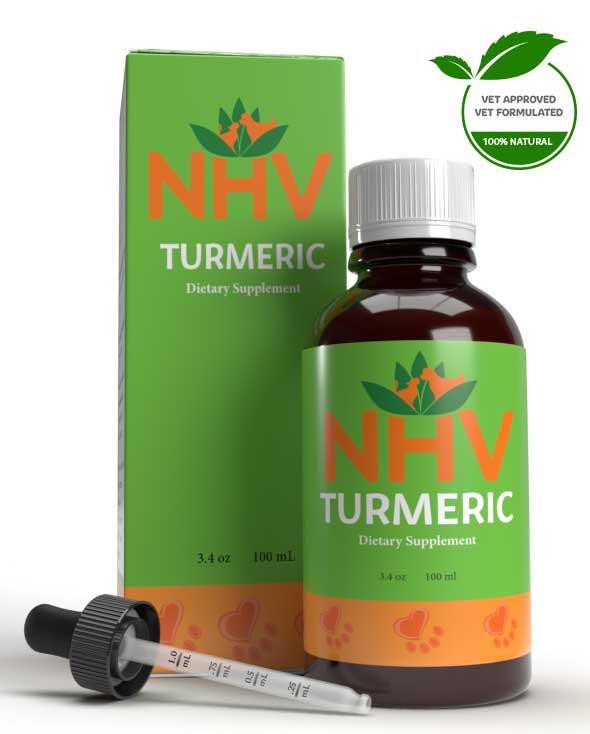
Support for Arthritis and Cancer
buy 2 and save $3
3 month supply for a small to medium size
From their tails to their whiskers, a cat’s body needs to be able to fight whatever comes their way - and not just the toys they like to chase, but health concerns too. NHV Turmeric for cats can be given to your furkiddos for a little extra TLC. This super herb offers support for a variety of conditions like cardiovascular issues, skin health, liver and kidney disease, arthritis, and overall well-being.
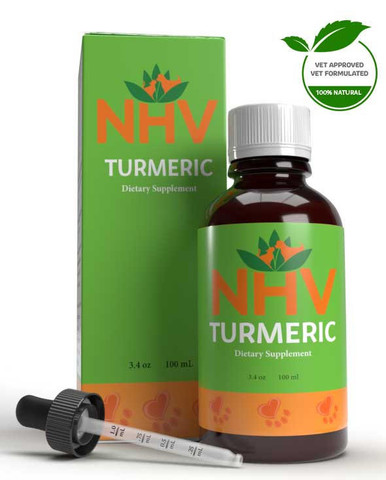
From their tails to their whiskers, a cat’s body needs to be able to fight whatever comes their way - and not just the toys they like to chase, but health concerns too. NHV Turmeric for cats can be given to your furkiddos for a little extra TLC. This super herb offers support for a variety of conditions like cardiovascular issues, skin health, liver and kidney disease, arthritis, and overall well-being.
Want to get your feline friend on a wellness-promoting supplement? Turmeric is an excellent choice - it’s well-tolerated by our whiskered furkiddos, and can offer them many benefits!
What goes into your cat’s body every day will make a difference when it is time to fight a disease, or when they already have one. That’s why NHV supplements are designed to be given each and every day for things like:
It can even be used proactively before your furry friend becomes sick in the first place by giving them a regular boost of natural goodness!
Turmeric itself is a root with vibrant orange-golden flesh. It’s golden in the world of herbalism for pets with its many healing properties.
One of turmeric’s most well-recognized healing properties is its antioxidant content. Antioxidants can help scavenge for free radicals, which are unstable molecules that cause damage to the cells. The free radical scavenging properties of turmeric can support the body in processing and removing these molecules, minimizing the damage they can do.
At NHV, we are experts at harnessing the benefits of herbal ingredients specifically for your pets. When you choose NHV Turmeric, you’re choosing decades of holistic pet wellness experience from vets and herbalists. Our formula is:
We are proud to have been a part of many cats’ success stories over the decades. Check out this feline friend of ours, Willow, who has used our Turmeric for cats formula for comfort and wellness.
Willow’s Story: “I have no doubt that the supplements from NHV have been a huge part in maintaining her health and staving off the cancer that was found in late 2021”
Holistic Veterinarian Approves of Using Turmeric for Cats
Dr. Hillary, a holistic vet, writes an in-depth overview of Turmeric and why she believes turmeric can play a beneficial role in pet health. Read Dr. Hillary’s Turmeric overview here.
All NHV supplements are made with the finest quality organic or ethically harvested herbs. We use non-GMO vegetable glycerin as our base. NHV products are full-spectrum extracts.
Select your pet's weight to determine the correct dose.
To be taken twice daily. Determine your pet’s weight and then use the easy chart below to determine the correct dose. This is the minimum dosage.
Pet's Weight Dosage
0 - 15 lb = 0.5 ml
16 - 30 lb = 1.0 ml
31 - 45 lb = 1.5 ml
46 - 60 lb = 2.0 ml
61 - 75 lb = 2.5 ml
Over 75 lb = 3.0 ml
How to Administer
Shake well before use. The easiest method is to use the dropper provide and places the drops into your pet’s food or favorite treat. You can also use the dropper and squirt directly into the pet’s mouth.
Some pets can be finicky, if this occurs consider hiding the drops in foods most pet’s love such as fish, chicken or yogurt or a favourite treat. If your pet only eats dry food then soak a few kibbles at feeding time.
For Best Results
Herbal dietary supplements are beneficial to the health and wellbeing of your pet and are safe for long-term use. Every pet responds to natural herbal supplements differently, therefore it is important to be consistent and administer the product daily. Supplements generally take two to four weeks to take effect, however this will vary from one animal to the next.
Product Storage
All NHV Natural Pet Products are pure herbal extracts and contain no artificial additives, preservatives or coloring. Shelf life after opening is 6 months and must be refrigerated after opening.
Cautions and Contraindications: Do not use Turmeric in pregnant or nursing animals. Speak to your vet before using our products. A second visit is recommended if your pet’s condition does not improve, or deteriorates after continued use of the supplements.
Want to get your feline friend on a wellness-promoting supplement? Turmeric is an excellent choice - it’s well-tolerated by our whiskered furkiddos, and can offer them many benefits!
What goes into your cat’s body every day will make a difference when it is time to fight a disease, or when they already have one. That’s why NHV supplements are designed to be given each and every day for things like:
It can even be used proactively before your furry friend becomes sick in the first place by giving them a regular boost of natural goodness!
Turmeric itself is a root with vibrant orange-golden flesh. It’s golden in the world of herbalism for pets with its many healing properties.
One of turmeric’s most well-recognized healing properties is its antioxidant content. Antioxidants can help scavenge for free radicals, which are unstable molecules that cause damage to the cells. The free radical scavenging properties of turmeric can support the body in processing and removing these molecules, minimizing the damage they can do.
At NHV, we are experts at harnessing the benefits of herbal ingredients specifically for your pets. When you choose NHV Turmeric, you’re choosing decades of holistic pet wellness experience from vets and herbalists. Our formula is:
We are proud to have been a part of many cats’ success stories over the decades. Check out this feline friend of ours, Willow, who has used our Turmeric for cats formula for comfort and wellness.
Willow’s Story: “I have no doubt that the supplements from NHV have been a huge part in maintaining her health and staving off the cancer that was found in late 2021”
Holistic Veterinarian Approves of Using Turmeric for Cats
Dr. Hillary, a holistic vet, writes an in-depth overview of Turmeric and why she believes turmeric can play a beneficial role in pet health. Read Dr. Hillary’s Turmeric overview here.
All NHV supplements are made with the finest quality organic or ethically harvested herbs. We use non-GMO vegetable glycerin as our base. NHV products are full-spectrum extracts.
Select your pet's weight to determine the correct dose.
To be taken twice daily. Determine your pet’s weight and then use the easy chart below to determine the correct dose. This is the minimum dosage.
Pet's Weight Dosage
0 - 15 lb = 0.5 ml
16 - 30 lb = 1.0 ml
31 - 45 lb = 1.5 ml
46 - 60 lb = 2.0 ml
61 - 75 lb = 2.5 ml
Over 75 lb = 3.0 ml
How to Administer
Shake well before use. The easiest method is to use the dropper provide and places the drops into your pet’s food or favorite treat. You can also use the dropper and squirt directly into the pet’s mouth.
Some pets can be finicky, if this occurs consider hiding the drops in foods most pet’s love such as fish, chicken or yogurt or a favourite treat. If your pet only eats dry food then soak a few kibbles at feeding time.
For Best Results
Herbal dietary supplements are beneficial to the health and wellbeing of your pet and are safe for long-term use. Every pet responds to natural herbal supplements differently, therefore it is important to be consistent and administer the product daily. Supplements generally take two to four weeks to take effect, however this will vary from one animal to the next.
Product Storage
All NHV Natural Pet Products are pure herbal extracts and contain no artificial additives, preservatives or coloring. Shelf life after opening is 6 months and must be refrigerated after opening.
Cautions and Contraindications: Do not use Turmeric in pregnant or nursing animals. Speak to your vet before using our products. A second visit is recommended if your pet’s condition does not improve, or deteriorates after continued use of the supplements.
Published: April 13, 2018
1 reply
Hi Jason,
We’re so sorry to hear that your little one is dealing with a rodent ulcer, we can only imagine how uncomfortable he must be. Please know that we’ll do everything we can to support you and your boy through this.
Traditional medications can be tough on a kitty’s body, especially the liver. So we highly recommend our Milk Thistle supplement for your little one. This powerful and all-natural supplement can help to support liver health while encouraging regeneration of the liver. Milk Thistle can also help to reduce inflammation as well which is super important when dealing with rodent ulcers.
Here’s more information on Milk Thistle for you:
https://www.nhvnaturalpetproducts.com/milk-thistle-for-cats/
Our in-house vet, Dr. Amanda, also recommended a hypoallergenic diet for your sweetheart. Here’s our blog with more information on hypoallergenic diets for you:
https://nhvpethealth.com/blog/hypoallergenic-diet-for-pets-what-it-means-and-does-your-pet-need-it/
We hope that with Milk Thistle and your boy’s immune health regimen, he’ll start to improve soon. Please feel free to reach out should you have any questions at all.
Yours in wellness,
Team NHV